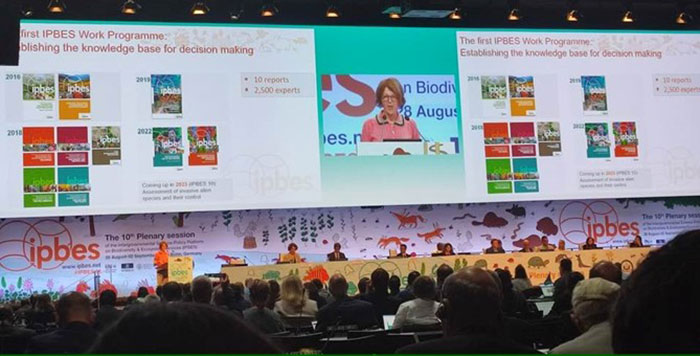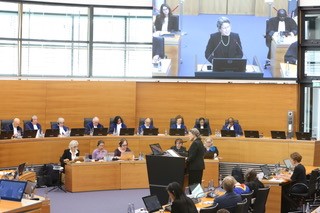Signature Initiatives

Center on Sustainability and Governance in the Anthropocene (C-SAGA)
Professors Pamela McElwee and Rachael Shwom, both of the Department of Human Ecology, have been awarded a National Science Foundation grant to plan a proposal for a Center on Sustainability and Governance in the Anthropocene. The award was made from the new NSF program on Centers for Research and Innovation in Science, the Environment and Society (CRISES), which funds interdisciplinary research to create evidence-based solutions that strengthen human resilience, security, and quality of life by addressing seemingly intractable challenges that confront society. Other RCEI affiliated faculty involved in planning includes Julie Lockwood (Ecology, Evolution and Natural Resources), Robert Kopp (Earth and Planetary Sciences), Marjorie Kaplan (Rutgers Climate Energy Institute), Victoria Ramenzoni, Cara Cuite, Karen O’Neill, and Cymie Payne (all from the Department of Human Ecology), Danielle Falzon (Sociology), and Kevon Rhiney, Kevin St. Martin and Jesse Rodenbiker (all from Geography) and Andrea Restrepo-Mieth (Bloustein School of Planning and Public Policy).
Effective governance, the process of making and enforcing decisions in societies at multiple scales, will be needed to address environmental crises like climate change, biodiversity loss, and unsustainable development that are accelerating rapidly due to human activity. The funded research team based at Rutgers will design a future Center on Sustainability and Governance in the Anthropocene (C-SAGA) that focuses on innovative interdisciplinary social science research that develops and assesses new forms of environmental governance. The future Center will be designed to learn from successful governance models and to launch new innovations that improve stakeholder participation, involve diverse knowledge systems, and help create more equitable outcomes for all through engaging with policymakers to design and implement transformative experiments.

The 10th Plenary of the Intergovernmental Science-Policy Platform on Biodiversity and Ecosystem Services (IPBES) meeting held in Bonn in August 2023. Dr. Pam McElwee (far right) co-chairs the ‘nexus’ assessment on the interactions between biodiversity, water, food, health and climate, and her work with this institution will be part of the “Piloting Equity-driven Nature-based solutions to Biodiversity Loss and Invasive Species” case study used to develop the proposal for Center for Sustainability and Governance in the Anthropocene.
“We are facing an interdependent and interconnected world in which environmental problems are far more complex than ever before. Scientists need to move beyond describing these complexities and engage in helping to design solutions that are both nimble and inclusive,” notes Dr. McElwee. Policy innovations are needed to address, among other issues, the interdependence of ecological and socio-economic systems; spatially and temporally distant and diffuse environmental impacts; novel conditions of deep uncertainty about many emerging problems; and the potential for irreversible tipping points, cascades, and feedbacks in the earth system. Dr. Shwom adds, “Tackling these new challenges requires more than just better scientific knowledge. We need to understand how social networks, actors and policymakers can build solutions together that are grounded in how humans interact, behave, and problem-solve in real life.”
The year-long planning process centers on three case studies where Rutgers has notable research strengths: Fisheries and Marine Governance in the Face of Rapid Environmental Change, Safeguarding Island Food Systems Under a Changing Climate, and Piloting Equity-driven Nature-based Solutions to Biodiversity Loss and Invasive Species. Working groups have been formed around each of these topics and researchers have begun to work together to answer overarching questions to characterize the governance systems and key social science research questions. The working groups are working to answer important questions like “what are the key mechanisms for information flows in your socio-ecological system?”; ”What kinds of monitoring systems are necessary in your SES, and how can systems ensure new information is integrated and used? ; and “What key social science questions have been asked about your SES? Is social science used to inform policy in your SES?”

Professor Cymie Payne presenting an oral argument on behalf of the International Union for the Conservation of Nature (IUCN) to the International Tribunal for the Law of the Sea in Hamburg, Germany (September 2023) regarding the obligations of States under the Law of the Sea Convention to prevent, reduce, and control pollution from greenhouse gases and to protect and preserve the ocean from the effects of climate change and ocean acidification. Professor Payne’s work as Chair, Ocean Law Specialist Group, IUCN, World Commission on Environmental Law will be part of the “Fisheries and Marine Governance in the Face of Rapid Environmental Change” case study used to develop the Center for Sustainability and Governance in the Anthropocene proposal.
A public symposium “Sustainability Governance in the Anthropocene” was held on May 7, 2024 at Rutgers University, bringing together Dr. Jennifer Clapp, University of Waterloo; Dr. Ratana Chuenpagdee, Memorial University of Newfoundland; and Dr. Meredith Gore, University of Maryland to explore and inform these issues. More specifically, these experts addressed how we can manage major challenges like climate change, food security, and biodiversity loss in the face of accelerating human pressure, increasing complexity, and persistent inequality. You can watch the talks from this symposium here. Following the public symposium, the working group teams met for a two-day workshop to further develop the full grant.
Rutgers collaborators will work together with other scientists around the globe to explore possible solutions to these problems, compare governance challenges, and identify mechanisms to address them. The team will also undertake an assessment of sustainability governance education at Rutgers and beyond and assess student needs at both undergraduate and graduate levels. The future center proposal will be designed around experiments in innovation, diffusion, and learning, including developing incubators for governance actors to exchange and scale up models, and training to improve capacities in governing across knowledges and scales.
If you are an undergraduate or graduate student, postdoc, or faculty interested in sustainability governance and participating in the planning process please contact Rachael Shwom at shwomrac@sebs.rutgers.edu or Pamela McElwee at pm473@sebs.rutgers.edu.



